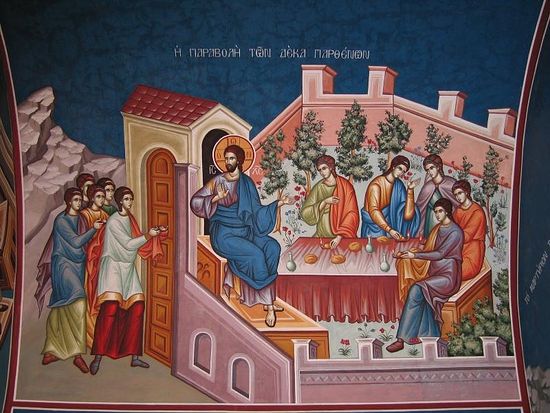On Monday evening of Holy Week, we remember that on this day the religious leaders, motivated by envy, strike a deal with Judas, motivated by love of money, to betray Jesus. The hymns, however, reflect mostly on the parables of Matthew 25. These parables are the heart of the Orthodox Christian understanding of how we ought to relate to God and neighbour in order to cooperate with God’s saving Grace. Consider, for example, the following hymn in which various ways are presented by which a person can increase the ‘talent’ of Grace given to them. It is particularly noteworthy that there is not just one way to cooperate with God’s Grace. We each have been given ways to glorify God and love our neighbour unique to us, and these we must ply.
Come, you faithful, and let us serve the Master eagerly, for He gives riches to His servants. Each of us according to the measure that we have received, let us increase the talent of grace. Let one gain wisdom through good deeds; let another celebrate the Liturgy with beauty; let another share his faith by preaching to the uninstructed; let another give his wealth to the poor. So shall we increase what is entrusted to us, and as faithful stewards of His grace we shall be counted worthy of the Master’s joy. Bestow this joy upon us, Christ our God, in your love for mankind.
Another hymn from this service is particularly significant in that it is also the prayer said by anyone who enters the Altar area of a Church. Like many Orthodox prayers, it states a paradox and a tension that we constantly hold in our hearts and minds. On the one hand, we are unworthy, or rather worthy of just condemnation. On the other hand, we draw near to God (as best as we are able) trusting that the Judge loves all humanity and will cleans our souls and save us.
How shall I, the unworthy, dare to enter the brilliance of your holy place? If I venture to enter into the bridal chamber, my garment will denounce me, for it is not a wedding garment, and I shall be cast out bound by the angels. Cleanse, O Lord, the defilement of my soul, and save me, for you are the Lover of mankind.
Finally, it is helpful to keep in mind when we reflect on the parable of the wise and foolish virgins that all of them fell asleep. That is, even the wise were unable to be fully attentive to their salvation. So what then is the difference between the wise and the foolish? The difference is that the wise brought extra oil. The word ‘oil,’ in Greek, is a near synonym of the word ‘mercy.’ Many Orthodox commentators have pointed out that one of the lessons of this parable is that while ascetic practice is important (virginity), mercy shown to our brothers and sisters is what separates the wise from the foolish. May God grant us His wisdom.

















